| Listing 1 - 10 of 74 | << page >> |
Sort by
|
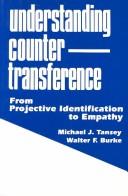
ISBN: 0881630640 Year: 1989 Publisher: Hillsdale Analytic press
Abstract | Keywords | Export | Availability | Bookmark
 Loading...
Loading...Choose an application
- Reference Manager
- EndNote
- RefWorks (Direct export to RefWorks)
Book
ISBN: 9781899209170 1899209174 Year: 2016 Publisher: [London] : Process Press Ltd,
Abstract | Keywords | Export | Availability | Bookmark
 Loading...
Loading...Choose an application
- Reference Manager
- EndNote
- RefWorks (Direct export to RefWorks)
Book
ISBN: 2040169296 9782040169299 Year: 1987 Publisher: Paris : Dunod,
Abstract | Keywords | Export | Availability | Bookmark
 Loading...
Loading...Choose an application
- Reference Manager
- EndNote
- RefWorks (Direct export to RefWorks)
Book
Year: 2020 Publisher: Paris : Presses Universitaires de France,
Abstract | Keywords | Export | Availability | Bookmark
 Loading...
Loading...Choose an application
- Reference Manager
- EndNote
- RefWorks (Direct export to RefWorks)
Éros est incertain et son incertitude est essentielle. Il ne vit que de son échec, il meurt de son succès. L'analyste est là, écrivait François Gantheret, ' pour que se scénarise dans l'espace de l'analyse le dispositif d'émergence des signes '. L'impensable est à la fois moteur et horizon, point de fuite de la pensée, au sens où il est ce qui ordonne le ' paysage ' psychique, tout autant que le lieu où la pensée fuit, se fuit, se perd. Une phrase d'André Breton paraissait, à François Gantheret, la meilleure définition qui soit de l'analyse: ' Comme si je m'étais perdu et qu'on vînt tout à coup me donner de mes nouvelles.
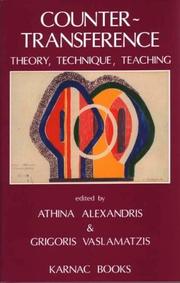
ISBN: 0429912331 042989810X 0429473338 1283118238 9786613118233 1849401160 9781849401166 9781283118231 6613118230 9780429898105 9780429473333 1855750287 9781855750289 Year: 1993 Publisher: London : Karnac Books,
Abstract | Keywords | Export | Availability | Bookmark
 Loading...
Loading...Choose an application
- Reference Manager
- EndNote
- RefWorks (Direct export to RefWorks)
A collection of papers on the Oedipus complex, divided into three parts: theory, practice and supervision. The contributors, who include Joyce McDougall, Hanna Segal, Otto Kernberg and Leon Grinberg, invite the reader to explore with them the processes affecting the therapist's mind - and, occasionally his body - during psychoanalytic therapy, and the reasons why the therapist thinks, feels, and reacts in a particular way. The full significance of these processes, referred to as "counter-transference" since Freud's time, has recently been recognized, resulting in the therapist's use of additional resources so that he or she can understand and help the patient more effectively. In the 1950s and 1960s, Paula Heimann and Heinrich Racker, following on Freud's own observations, made important contributions to the study of the countertransference, considerably enlarging upon the concept and re-evaluating the nature of the psychoanalytic therapeutic relationship as a result.
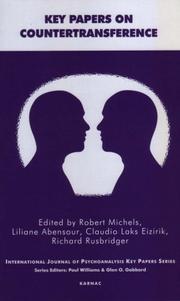
ISBN: 0429915438 0429901208 0429476434 1283125765 9786613125767 1849403538 9781849403535 9780429476433 9781283125765 6613125768 1855759616 9781855759619 Year: 2019 Publisher: Abingdon, Oxon : Routledge,
Abstract | Keywords | Export | Availability | Bookmark
 Loading...
Loading...Choose an application
- Reference Manager
- EndNote
- RefWorks (Direct export to RefWorks)
The International Journal of Psychoanalysis Key Papers Series brings together the most important psychoanalytic papers in the journal's eighty-year history in a series of accessible monographs. Approaching the IJP's intellectual rsources from a variety of perspectives, the monographs highlight important domains of psychoanalytic enquirry. 'The papers in this volume were commissioned with a view to describing the current views of countertransference, and their historical evolution, in four intellectual communities of psychoanalysis: North America, Britain, France and Latin America. 'Psychoanalysis is still sometimes described as a monolithic and unchanging theory and practice. These papers vividly contradict such a view through their close study of the evolution of the concept of countertransference from the periphery of psychoanalysis to its current position of central importance in most analytic communities. In doing so, they provide a window of the development of a living and evolving discipline during its first one hundred years.'- From the Introduction by Richard Rusbridger
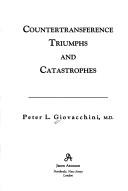
ISBN: 0876688792 Year: 1989 Publisher: New York (N.Y.): Aronson
Abstract | Keywords | Export | Availability | Bookmark
 Loading...
Loading...Choose an application
- Reference Manager
- EndNote
- RefWorks (Direct export to RefWorks)
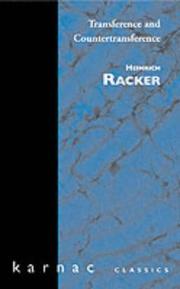
ISBN: 1781811008 0429923201 0429484208 1282900323 9786612900327 1849400199 9781849400190 0950714690 9780950714691 Year: 1982 Publisher: London Karnac Books
Abstract | Keywords | Export | Availability | Bookmark
 Loading...
Loading...Choose an application
- Reference Manager
- EndNote
- RefWorks (Direct export to RefWorks)
When first published, the author's papers were quickly appreciated as a benchmark in the ongoing, although at the time underdeveloped, understanding of the vital importance of countertransference in the psychoanalytic process. In subsequent years a great deal has been written on the subject without diminishing the classic status ofthe author'sfundamental intervention. Transference, and especially countertransference, constitute the principle focus and axis of the author's re-examination and development of psychoanalytic technique and theory, written to address a perceived gap between psychoanalytic knowledge and its capacity to effect psychological transformation in the patient. This reissued edition makes available again a cogent, lucid and elegantly articulate contribution to a central psychoanalytic topic.
Book
ISBN: 0429908989 0429484216 1283070901 9786613070906 1849407134 9781849407137 9781855757189 1855757184 Year: 2011 Publisher: London Karnac
Abstract | Keywords | Export | Availability | Bookmark
 Loading...
Loading...Choose an application
- Reference Manager
- EndNote
- RefWorks (Direct export to RefWorks)
Since Freud's initial papers on transference and countertransference, these vast and inexhaustible subjects have occupied psychoanalysts. Transference and countertransference, the essence of the patient/analyst relationship, are concepts so central to psychoanalysis that, to our minds, they transcend theoretical orientation and, thus, can be seen as the unifying focus of psychoanalysis. However differently theoretical traditions conceptualize the transference, or disagree as to when and how to interpret it in our everyday analytic work, we all embrace the phenomena as vital to psychic change.T
Book
ISBN: 0823610853 Year: 1987 Publisher: New York (N.Y.): International universities press
Abstract | Keywords | Export | Availability | Bookmark
 Loading...
Loading...Choose an application
- Reference Manager
- EndNote
- RefWorks (Direct export to RefWorks)
| Listing 1 - 10 of 74 | << page >> |
Sort by
|

 Search
Search Feedback
Feedback About UniCat
About UniCat  Help
Help News
News